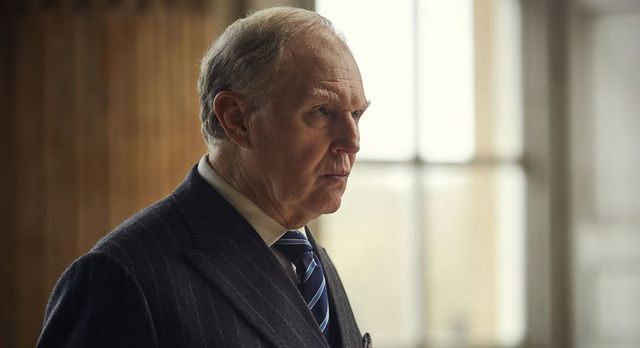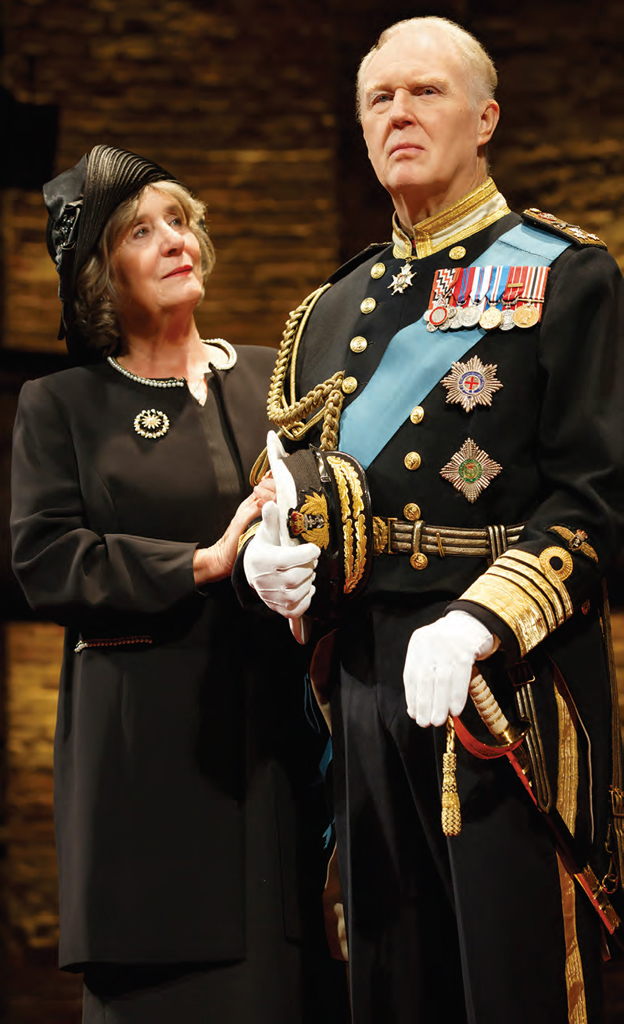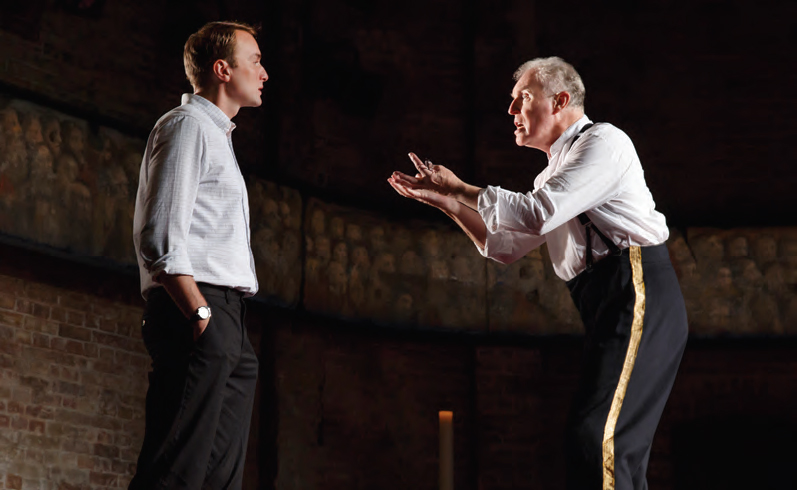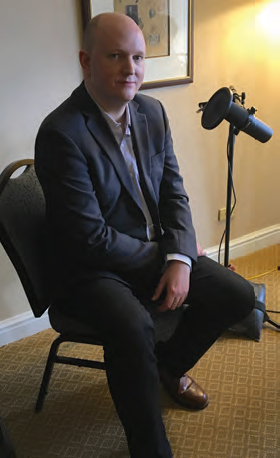
The Late, Great Tim Pigott-Smith and Writer Mike Bartlett on the “Future History” and Shakespearean Drama of Their New TV Movie
“But now I’ll rise to how things have to be/The Queen is dead, long live the King. That’s me,” declares Prince Charles, played by Tim Pigott-Smith, who spoke those same lines during the show’s Olivier Award–winning and Tony-nominated theatrical runs. Modeled after Shakespeare’s history plays, the story starts in the near future: at Queen Elizabeth II’s funeral procession. The play was actually billed as “future history” while on the London and Broadway stages, “since we do know that it is going to eventually happen,” notes writer Mike Bartlett (Doctor Foster and Love, Love, Love). In King Charles III, the longest-serving heir apparent finally accedes to the throne.
Pigott-Smith recites a few lines from the opening scene for us, admiring his character’s dry wit about the situation: “After the funeral, Kate Middleton says, ‘I never thought I’d see her pass away,’ and Charles says, ‘I felt the same.’ ”
Emotional preparation for Her Majesty’s earthly departure is just one of many good reasons to tune in. “When the Queen was ill over Christmas, the country went into a very weird state of paralysis,” says Pigott-Smith, who is perhaps still best known to Americans as evil police captain Ronald Merrick in 1984’s The Jewel in the Crown. “Because the big question is, What is being English now? Without her, what holds us together? Maybe she’s the only thing left.”
Enter Charles, Prince no longer and eager to fill that role after decades of wait. However, the new King quickly heads down a decidedly different path from his mother, who was always careful to remain politically neutral. When the Prime Minister presents him a new law to rein in the intrusive tabloids, Charles withholds his approval. “He makes this stand against curtailing freedom of the press,” explains Pigott-Smith, “even though he himself has been hounded by the press. The Prime Minister even says to him that his wife was hounded to death by them, by the press.” (“That’s bold. So soon in our relationship,” Charles replies. “To utilize Diana.”)
[caption id="RoyalPainKingCharlesIII_img1" align="aligncenter" width="703"]

© JOAN MARCUS
“We all know that he likes to be involved, to have influence,” adds Bartlett, who claims the plot twist is very much in keeping with the Prince of Wales’s character. (He’s partly referring to the “Black Spider” memos, a scandal in the UK; it was revealed that Charles wrote letters with his political opinions to government officials for years. Even Charles has called himself a “meddling Prince.”)
“The starting point is a reality. There are certain things he wants changed. He’s stood up for certain causes,” says Bartlett. “And we know that the King or Queen does have to sign bills into laws.” But Charles refuses to yield, will not give his signature: “For if my name is given through routine/ And not because it represents my view/ Then soon I’ll have no name, and nameless I/Have not myself….” The stalemate between elected officials and the new King sends Parliament into lockdown and the Royal Family into chaos. The very delicate balance of power within the constitutional monarchy threatens to be undone—and the script, blank verse written mostly in iambic pentameter, brings out more emotion than prose ever could.
“The language and the structure of verse makes it possible to take it to that higher level,” says Pigott-Smith. To write the lines, Bartlett actually spoke in iambic pentameter for a while. “Not to my friends and family,” he clarifies, “because I didn’t want to seem absolutely crazy, but I did speak a lot to myself to get to a point where I wasn’t counting the syllables on my fingers.”
The writer says that even he was surprised by how verse exposes the truth. “If you write in the Shakespearean form where people talk in ‘thus,’ they explain their psychology through metaphor. They use rhetoric to get what they want; they use language. It is incredibly revealing of character in a way that I hadn’t anticipated. Actually, that is its function—to tell you what these people are and give you imaginative images to understand them and what they are going through.” As for the monologues, well, they translate to the small screen easily—straight to the audience, just like on the stage. “It’s just turning to the camera and talking to the camera,” says Pigott-Smith, calling it “sort of House of Cards–style.”
While the language, filled with wit and metaphor, is revelatory, it is not the only Shakespearean aspect of the work. As a family epic and a succession story, there are echoes of the Bard throughout. “The strongest one for me is Richard II because, of course, he was a monarch who was deposed, but in terms of character and the breakdown of the family, he’s closest to Lear,” says Pigott-Smith, who, luckily, played Lear in 2011 before taking on Charles. “Those muscles, those big muscles of anger and despair, are quite useful for Charles. It was good training, in a way.”
That structure, the “who’s who,” fell into place very quickly for Bartlett, with each family member fast assuming their proper function. “Once I submit the whole idea of Charles as the tragic hero, OK—then it’s William who’s going to take him on. And who’s Kate? Well, that fits! And then there’s Harry’s subplot—yeah, that works. It all happened very quickly.” Not that it was easy; Bartlett was intimidated to put pen to paper for the ambitious project. “It was a long time before I plucked up the courage to actually write it,” he admits. “Why would I want to compare myself to the world’s greatest writer?”
“When you’re looking at the play objectively,” says Pigott-Smith, “you think, ‘Oh well, that’s Kate Middleton as Lady Macbeth! And here we have a bit of Henry IV, Part 1 with, you know, Harry going off to the tavern.’ ” There’s also some absurd comic relief—look out for the funny kebab vendor!—and even a ghost who could only ever be one person.
“How could you even tell this story of this family without her presence?” wonders Bartlett. “I imagine if you lost your mother, or your wife, in that way, that you never forget them—and they are often constantly in your thoughts,” says the playwright, who defends his use of the late Princess of Wales. “In a high-pressure situation, I think it makes complete sense their thoughts would turn to her and what she would say if she were there. In that Shakespearean way of a ghost being the manifestation of psychology, I think this is a real justification for her presence beyond anything sensationalist or exploitative.”
[caption id="RoyalPainKingCharlesIII_img2" align="aligncenter" width="797"]

© JOAN MARCUS
Watching her apparition is likely to give chills to viewers. The memory of Diana, gone 20 years this summer, obviously still lingers over both the Royals and the culture of the United Kingdom, just as her spirit hovers over the characters in King Charles III. “Do you know, after she died, I think there was a picture of her in the paper [in the UK] for almost every day for ten years?” marvels Pigott-Smith.
“If it were any normal play, I’m sure somebody would’ve told me I’ve gone too far and I should take the ghost out, but I am glad because Shakespeare did it, so I’m allowed to do it,” Bartlett adds.
Yet even with the ghost and all the references, echoes and reflections—including those of Richard II and King Lear, as mentioned, but also of Hamlet, Richard III and Macbeth—this epic tale is not only Shakespearean but also an entirely new creation. The character of King Charles, a mirror for so many of his fellow Kings, his brothers in epic tragedy, is also a brand-new one—and completely himself. “When you’re playing it, you are just thinking of your own character,” Pigott-Smith says, fittingly.
Hopefully, someday we’ll find out the real Prince’s take on the show. Perhaps he’ll watch the movie from some room in Clarence House? And then maybe Charles will again break with the Royal tradition of silence and share his thoughts. Pigott-Smith is sure, after all, that people from the palace have caught the stage production.
“I forgot to take my wedding ring off one night and put Charles’s signet ring on. The theater received a little note from the palace to the effect that Charles does not wear a wedding ring,” he says. “It was just their way of saying, ‘Don’t think we’re not watching.’ ”
King Charles III premieres on MASTERPIECE on PBS Sunday, May 14.
MASTERPIECE’s King Charles III Podcasts

PHOTOS COURTESY OF MASTERPIECE

PHOTOS COURTESY OF MASTERPIECE





Comments